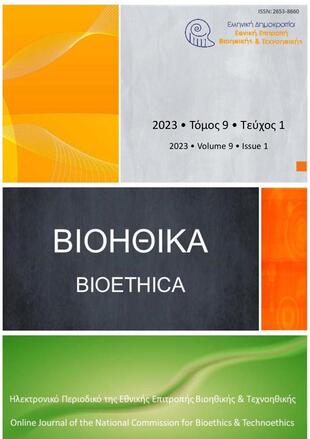Νευροηθική
Abstract
Η παρούσα ανασκόπηση εκπονήθηκε στο πλαίσιο του μαθήματος Βιοηθικής του ΠΜΣ Τοξικολογίας και αποτελεί μία προσπάθεια σύντομης ιστορικής αναδρομής του αφανούς κλάδου της Νευροηθικής, που, παρότι έκανε εκκωφαντική εμφάνιση πριν από δύο δεκαετίες, ωστόσο σύντομα έχασε σταδιακά το ενδιαφέρον της επιστημονικής κοινότητας. Οι αιτίες για την κάμψη ενός πολλά υποσχόμενου κλάδου αναζητούνται αμφοτερόπλευρα και αναλύονται διεξοδικά, ενώ οι ευθύνες αποδίδονται τόσο στην έλλειψη νοηματικής πληρότητας και συστηματικής μεθοδολογίας του νεοσύστατου κλάδου όσο και στην επιβράδυνση της εξέλιξης των νευροεπιστημών στο σύνολό τους. Παράλληλα, στο παρόν άρθρο επιχειρείται ο σαφής προσδιορισμός των όρων και εννοιών που διαδραματίζουν καίριο ρόλο για την κατανόηση του εν λόγω τομέα και παρατίθεται ένα πρωτόλειο σύστημα υπο-κατηγοριοποίησης που περιλαμβάνει την Εμπειρική Νευροηθική, τη Θεωρητική Νευροηθική και τη Μεθοδολογική Νευροηθική, με την τελευταία να αποτελεί μάλλον ευσεβή πόθο παρά εφαρμοσμένο επιστημονικό υπο-κλάδο. Τέλος, συζητούνται ορισμένα καίρια σύγχρονα ζητήματα Νευροηθικής, όπως η έλλογη συγκατάθεση, η νευρογενετική και η σχέση εγκεφάλου και πνεύματος, και σχολιάζονται με αναφορά στις αρχές της Φιλοσοφίας και της Θεολογίας.
Article Details
- Come citare
-
Γούτα Χ. (2023). Νευροηθική. Bioethica, 9(1), 37–49. https://doi.org/10.12681/bioeth.34073
- Fascicolo
- V. 9 N. 1 (2023): Bioethica
- Sezione
- Reviews

TQuesto lavoro è fornito con la licenza Creative Commons Attribuzione 4.0 Internazionale.
Authors who publish with this journal agree to the following terms:
- Authors retain copyright and grant the journal right of first publication with the work simultaneously licensed under a Creative Commons Attribution CC BY 4.0 License, which allows for immediate free access to the work and permits any user to read, download, copy, distribute, print, search, or link to the full texts of articles, crawl them for indexing, pass them as data to software, or use them for any other lawful purpose. Appropriate credit must be given by citing the author(s) and the original publication in this journal.
- Authors are able to enter into separate, additional contractual arrangements for the non-exclusive distribution of the journal's published version of the work (e.g. post it to an institutional repository or publish it in a book), with an acknowledgement of its initial publication in this journal.
We encourage authors to deposit their articles, as well as data underlying the publications, in institutional and/or other appropriate subject repositories.
Bioethica permits and encourages authors to archive the final publication pdf in institutional (e.g. the repository of the National Hellenic Research Foundation) or other appropriate subject repositories (e.g. SSOAR repository for social sciences), in compliance with institutional and/or funder open access policies, after publication in the BIOETHICA. Authors must provide bibliographic details that credit publication in the journal, as well as related funding details (when applicable).
Lists of institutional and other subject-based academic open access repositories can be found listed by country at the registry http://opendoar.org/countrylist.php
If your institution does not possess a repository you may deposit a copy of your paper at no cost with www.zenodo.org , the repository supported for open access research in the EU by the European Commission, through the project OpenAIRE (www.openaire.eu )



